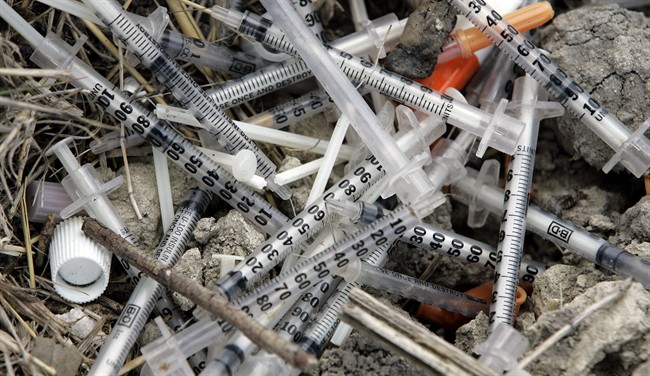TORONTO – Victims of the tainted blood scandal and their families are urging the Ontario and federal governments to stop proposed blood-plasma clinics from operating in the province.

Canada could face another blood tragedy unless the two governments refuse to approve three prospective paid-donor clinics in the Toronto area, said Antonia Swann, whose husband died after he contracted HIV and hepatitis C from tainted blood.
Private blood-donor clinics were part of the problem that led to the scandal, she said Thursday.
“I will not stand by and bury more friends and more family like my late husband James while we just sit back and allow another private blood-donor clinic to open,” she said.
Her husband “went through hell” and there’s no way of knowing what other kind of blood-bourne pathogen or disease is lurking out there, she said.
“Yes, we have a good system, but we don’t want to increase the risk, and I don’t want to see other Canadians hurt by another tainted blood tragedy.”
Thousands of people in Canada were infected with HIV and hepatitis C after receiving tainted blood transfusions in the 1980s.
Michael McCarthy, who received tainted blood, said Canadians must be vigilant to keep their blood supply safe.
Health Canada is currently looking at the clinics, but McCarthy said they need to open up their consultations to the public.
He’s calling on the federal government to not approve the prospective clinics and the province to use its legislative powers to stop blood plasma clinics from setting up shop in Ontario.
The governing Liberals should pass legislation outlawing payments for blood, like Quebec, said Ontario NDP health critic France Gelinas.
Health Minister Deb Matthews raised concerns in March about new clinics that would pay people to provide blood plasma.
She wrote to her federal counterpart Leona Aglukkaq asking that any approvals be delayed until Health Canada consulted the provinces and other groups.
“I have very, very big concerns,” she said Thursday. “I have got big questions and I need answers to those questions before I’m comfortable moving forward.”
It’s not just safety of the blood supply, she said. If a clinic can offer payment for blood, that could have an impact on blood donations.
“It is absolutely foundational, this notion of voluntarily giving so it’s there for you when you need it,” Matthews said.
A spokesman for Aglukkaq said Health Canada is still reviewing the company’s application and will base their judgment on safety of the blood system.
“It is up to the province to decide whether or not payment for plasma can happen,” said spokesman Steve Outhouse.
Health Canada consulted with stakeholders, including the families of tainted blood victims, he said. A summary of those consultations will be posted for the public, who will be able to submit comments. Public hearings are also planned, but the details have yet to be determined, he said.
Plasma is a component of blood that contains many proteins and can be used to treat diseases. Hospitals and pharmaceutical companies buy it, Matthews said.
Winnipeg-based drug maker Cangene, which has been operating for decades, is authorized to pay donors for blood plasma, which is used in its products.
The federal government launched a public inquiry in 1993 to look into the tainted blood tragedy.
Justice Horace Krever spent four years in his investigation and made 50 recommendations when he issued his report in 1997. Among them were tighter rules for blood services and no-fault compensation for the victims.
His final report also recommended that blood donors shouldn’t be paid for their donations, except in rare circumstances.



Comments